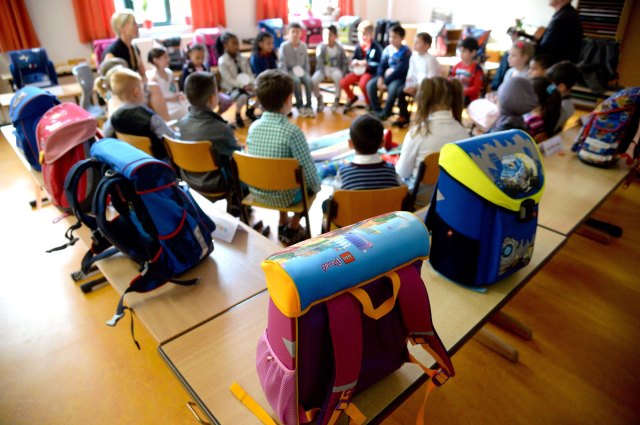Credit: Peter Steffen/dpa

By funding public services, governments spend money on our behalf. But what if they gave it to us directly so that we could decide how to spend it?
Obviously, some of us would spend it on holidays and ice cream rather than the intended purpose. Hence the idea of distributing spending power in the form of a voucher that could only be used for certain purposes and with various conditions attached. For example, parents could be given school vouchers, which they could ‘spend’ at an educational establishment of their choice (the choice being from a shortlist approved by the government).
The theory is that, by empowering consumers (i.e. the parents), providers (i.e. the schools) would have to become more responsive to those they serve. This sort of thinking used to be very fashionable – at least on the centre-right of politics, where vouchers were promoted as a way of applying market forces to public services.
In some places, voucher schemes made it out of the think-tanks and into the real world – but did they work?
Writing for Bloomberg, Megan McArdle confesses her doubts:
“Like many of my fellow libertarians, I genuinely believed that this would be an economic and social revolution that would, over time, lift millions out of poverty and alleviate all manner of social ills.
“Twenty years on, my optimism seems to have been far too exuberant. Some studies suggest that voucher programs do modest good; others suggest that they do very little; and a few suggest that the impacts are actually negative. My overall takeaway from the literature is that voucher programs probably do a little bit of good. But the emphasis is on the word ‘little’; they are not a cure-all, or even much of a cure for anything. It was reasonable to think, in 1997, that voucher programs could change the world. Now we have two decades of evidence.”
McArdle points out that the pet policies of the centre-left have also met with disappointing results:
“…during the same period, vast sums were poured into liberal projects like smaller class sizes, and the results have been entirely uninspiring. Now the mania is for universal pre-K [early years education], not so much because there’s compelling evidence for great outcomes, but because at least we haven’t tried it yet, and therefore don’t know that it won’t work.”
Nevertheless, those on the free market right of politics have some explaining to do. Having unleashed the almighty power of choice, why didn’t it make a bigger difference to educational outcomes? McArdle runs through some of the possibilities, before getting to the most likely, but least comfortable, explanation:
“…there’s another possibility, suggested recently in an NBER working paper: Maybe vouchers don’t improve school quality too much because quality is not what parents look for when they’re choosing their children’s schools.”
What might be they be looking for instead?
“…the quality of the pedagogy isn’t the only thing that shapes student outcomes in schools. The peer group matters a great deal; families with higher socioeconomic status are better able to navigate the educational system, and they value education very highly, traits they pass on to their children. Those parents also work hard to improve the quality of the schools their children attend.
“The socioeconomic status of the students in a school is somewhat easier for parents to observe than the quality of the pedagogy. It’s not then, all that surprising that when researchers sat down to analyze parental decision-making in New York City public school, peer group seemed to be what parents were looking at. And peer group matters a great deal.”
If the most motivated and best-connected parents were using their power of choice to push for higher standards, then all families could, in theory, benefit. But if the power of choice is mainly used by privileged parents to ensure that their kids go to school with kids from similar families, then other families are, by definition, excluded:
“Improving the quality of instruction can make everyone better off; peer group, on the other hand, is a zero-sum game, where every child who improves their peer group must be counterbalanced by one who is pushed out.”
It should be said that the privileged don’t need vouchers to self-segregate. They have many other means, not least the affordability of housing in areas with good schools. It’s as if they’ve struck a mephistophelian bargain with the rest of society – an unspoken, but highly effective, agreement that goes something like this:
We won’t judge you. We won’t tell you how to live or raise your kids. We’ll even give you money (through the state, don’t expect much in the way of pay rises). In return, we’ll lead different lives. We’ll live in different neighbourhoods. We’ll browse in different shops and eat in different restaurants. And, yes, our children will go to different schools.










Join the discussion
Join like minded readers that support our journalism by becoming a paid subscriber
To join the discussion in the comments, become a paid subscriber.
Join like minded readers that support our journalism, read unlimited articles and enjoy other subscriber-only benefits.
Subscribe